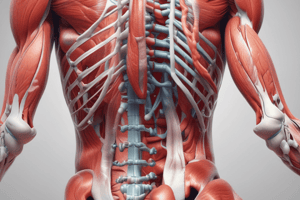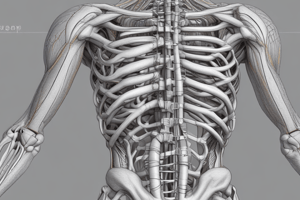Podcast
Questions and Answers
What is the primary structural unit of a myofibril?
What is the primary structural unit of a myofibril?
- Sarcoplasm (correct)
- Mitochondria (correct)
- Z-line (correct)
- Sarcomere (correct)
Which type of filament interacts with the active site of actin during muscle contraction?
Which type of filament interacts with the active site of actin during muscle contraction?
- Thick filament (correct)
- Elastic filament
- Reticular filament
- Thin filament
What is the diameter range of a skeletal muscle fiber?
What is the diameter range of a skeletal muscle fiber?
- 10-100 µm (correct)
- 1-10 µm
- 100-1000 µm
- 1000-2000 µm
What are the two types of tubular structures found in muscle fibers?
What are the two types of tubular structures found in muscle fibers?
What is the role of the Z-line in the myofibril structure?
What is the role of the Z-line in the myofibril structure?
What causes the transverse striations observed in skeletal muscle fibers?
What causes the transverse striations observed in skeletal muscle fibers?
Which type of muscle tissue comprises approximately 40% of the body?
Which type of muscle tissue comprises approximately 40% of the body?
What type of filament makes up the thin filaments in myofibrils?
What type of filament makes up the thin filaments in myofibrils?
Flashcards are hidden until you start studying
Study Notes
Skeletal Muscle Overview
- Skeletal muscle constitutes approximately 40% of body mass, while smooth and cardiac muscles account for nearly 10%.
- Similar principles of contraction apply across all muscle types.
Physiologic Anatomy
- Each skeletal muscle consists of numerous parallel-arranged muscle fibers.
- Muscle fibers are cylindrical, measuring 10-100 µm in diameter.
- The cell membrane of muscle fibers is known as sarcolemma; the cytoplasm is referred to as sarcoplasm.
- Sarcoplasm contains organelles like mitochondria and Golgi apparatus, as well as myofibrils which are contractile elements.
- A muscle fiber houses hundreds to thousands of myofibrils.
Myofibrils and Striations
- Two types of tubular structures associated with myofibrils: longitudinal tubules and transverse (T) tubules.
- Skeletal muscle fibers are categorized as striated muscles due to visible transverse striations.
- Myofibrils have alternating light (I) and dark (A) bands.
- The I band is interrupted by a dark line called the Z-line, with segments between Z-lines termed sarcomeres (the functional unit).
- The A band features a lighter area known as the H band.
Myofilaments
-
Myofibrils comprise finer myofilaments categorized as thin and thick filaments.
-
Thin Filament (Actin Filament):
- Extends from the Z-line towards but does not reach the middle of the H band when the fiber is at its normal resting length (about 2 µm for the sarcomere).
- Composed of approximately 3000 actin filaments formed from globular actin molecules (G actin).
- Features an active site essential for interaction with cross bridges from thick filaments (myosin) to facilitate muscle contraction.
Studying That Suits You
Use AI to generate personalized quizzes and flashcards to suit your learning preferences.




